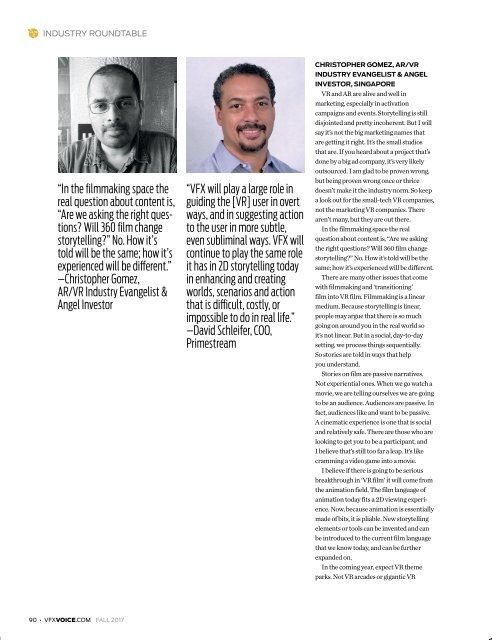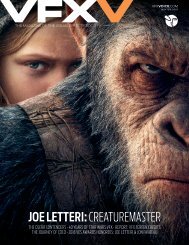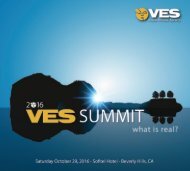Create successful ePaper yourself
Turn your PDF publications into a flip-book with our unique Google optimized e-Paper software.
INDUSTRY ROUNDTABLE<br />
“In the filmmaking space the<br />
real question about content is,<br />
“Are we asking the right questions?<br />
Will 360 film change<br />
storytelling?” No. How it’s<br />
told will be the same; how it’s<br />
experienced will be different.”<br />
—Christopher Gomez,<br />
AR/VR Industry Evangelist &<br />
Angel Investor<br />
“<strong>VFX</strong> will play a large role in<br />
guiding the [VR] user in overt<br />
ways, and in suggesting action<br />
to the user in more subtle,<br />
even subliminal ways. <strong>VFX</strong> will<br />
continue to play the same role<br />
it has in 2D storytelling today<br />
in enhancing and creating<br />
worlds, scenarios and action<br />
that is difficult, costly, or<br />
impossible to do in real life.”<br />
—David Schleifer, COO,<br />
Primestream<br />
CHRISTOPHER GOMEZ, AR/VR<br />
INDUSTRY EVANGELIST & ANGEL<br />
INVESTOR, SINGAPORE<br />
VR and AR are alive and well in<br />
marketing, especially in activation<br />
campaigns and events. Storytelling is still<br />
disjointed and pretty incoherent. But I will<br />
say it’s not the big marketing names that<br />
are getting it right. It’s the small studios<br />
that are. If you heard about a project that’s<br />
done by a big ad company, it’s very likely<br />
outsourced. I am glad to be proven wrong,<br />
but being proven wrong once or thrice<br />
doesn’t make it the industry norm. So keep<br />
a look out for the small-tech VR companies,<br />
not the marketing VR companies. There<br />
aren’t many, but they are out there.<br />
In the filmmaking space the real<br />
question about content is, “Are we asking<br />
the right questions? Will 360 film change<br />
storytelling?” No. How it’s told will be the<br />
same; how it’s experienced will be different.<br />
There are many other issues that come<br />
with filmmaking and ‘transitioning’<br />
film into VR film. Filmmaking is a linear<br />
medium. Because storytelling is linear,<br />
people may argue that there is so much<br />
going on around you in the real world so<br />
it’s not linear. But in a social, day-to-day<br />
setting, we process things sequentially.<br />
So stories are told in ways that help<br />
you understand.<br />
Stories on film are passive narratives.<br />
Not experiential ones. When we go watch a<br />
movie, we are telling ourselves we are going<br />
to be an audience. Audiences are passive. In<br />
fact, audiences like and want to be passive.<br />
A cinematic experience is one that is social<br />
and relatively safe. There are those who are<br />
looking to get you to be a participant, and<br />
I believe that’s still too far a leap. It’s like<br />
cramming a video game into a movie.<br />
I believe if there is going to be serious<br />
breakthrough in ‘VR film’ it will come from<br />
the animation field. The film language of<br />
animation today fits a 2D viewing experience.<br />
Now, because animation is essentially<br />
made of bits, it is pliable. New storytelling<br />
elements or tools can be invented and can<br />
be introduced to the current film language<br />
that we know today, and can be further<br />
expanded on.<br />
In the coming year, expect VR theme<br />
parks. Not VR arcades or gigantic VR<br />
90 • <strong>VFX</strong>VOICE.COM FALL <strong>2017</strong>




